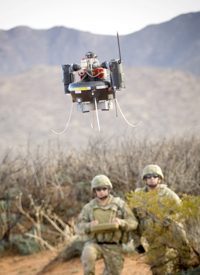
The Miami-Dade Police Department has purchased an aerial drone, the Honeywell T-Hawk, that will allow the department to “track suspects, sweep past houses, and peep through windows,” according to the Miami New Times. The drone, similar to those used by the U.S. military in Iraq and Afghanistan, will be equipped with cameras to spy wherever and whenever the cops choose to deploy it. Weighing in at 20 pounds, the drone can fly for 40 minutes at a time, climb as high as 10,500 feet, and cruise at 46 miles per hour.
The police, naturally, insist that the $50,000 vehicle, thought to have been purchased with a federal grant, is there merely to keep citizens and officers safe. “It gives us a good opportunity to have an eye up there. Not a surveilling eye, not a spying eye. Let’s make the distinction. A surveilling eye to help us to do the things we need to do, honestly, to keep people safe,” Miami-Dade Police Director James Loftus said.
Miami-Dade Sgt. Andrew Cohen “said [the] drone will be used to gather real time information in situations which may be too dangerous for officers,” the Miami CBS affiliate reports. “If an SRT (Special Response Team) has to go into an area they don’t know what’s there, we don’t know what is in the backyard,” said Cohen, “They want to know if there are dogs in the backyard, if there is a shed, things that could be a threat to us.”
However, as Florida American Civil Liberties Union Executive Director Howard Simon pointed out, “What happens when they fly over backyards and they see something without a warrant that they want to take [action] against?”
Even worse, what if the drone peeks in your window and sees something the cops find suspicious? “Police admit the [drone], if flown low enough, has the ability to look into people’s home[s],” says the CBS affiliate, “but that is not its intended purpose.” Little imagination is required to think of ways to rationalize expanding the use of the drone beyond its supposedly intended purpose.
Furthermore, if officer safety is the primary purpose of the drone, why not simply fit it with weapons and use it to gun down suspects from the comfort of the police station? That’s how the drones are being used against (often innocent) Iraqis and Afghans.
“All the legal and political and ethical … complications and questions we have to figure out are enormous,” P.W. Singer, author of Wired for War and expert on drones, told the New Times. Indeed they are, though a quick perusal of the Bill of Rights would certainly aid the process. The Fourth Amendment requires law enforcement to obtain a warrant to perform a search and to state in that warrant “the place to be searched, and the persons or things to be seized.”
Using the drone, as Cohen suggested, to “secure” the “perimeter” around an “ongoing police scene” is one thing. Flying the drone around Miami, looking at — and inside — anything the police choose to search is quite another; and it is certainly unconstitutional.
There is one ray of hope in all this: The Federal Aviation Administration has to approve the use of the drone for regular flights over an urban area, something the New Times says it has never done before. The police department has submitted its application, but the process can take months — possibly longer for something so novel. With any luck, the FAA will deny the request, and citizens of Miami-Dade can relax, knowing that the winged peeping Tom has been grounded. If, on the other hand, the FAA approves the request, expect other cities — some of which are already using x-ray vans to search people and vehicles surreptitiously — to join the drone bandwagon.
Between the Transportation Security Administration and police drones, the skies have never been less friendly to the Constitution.



